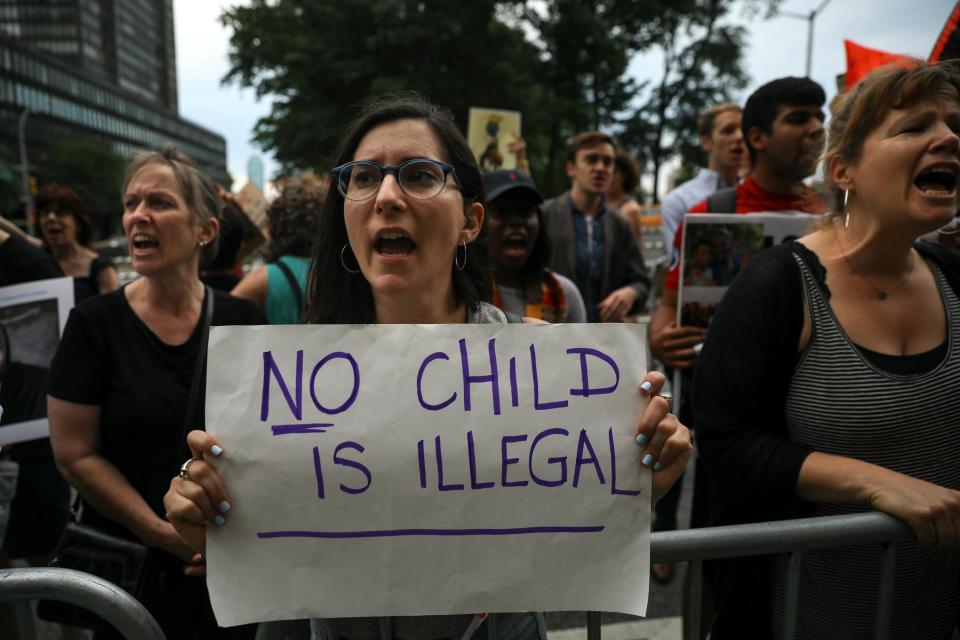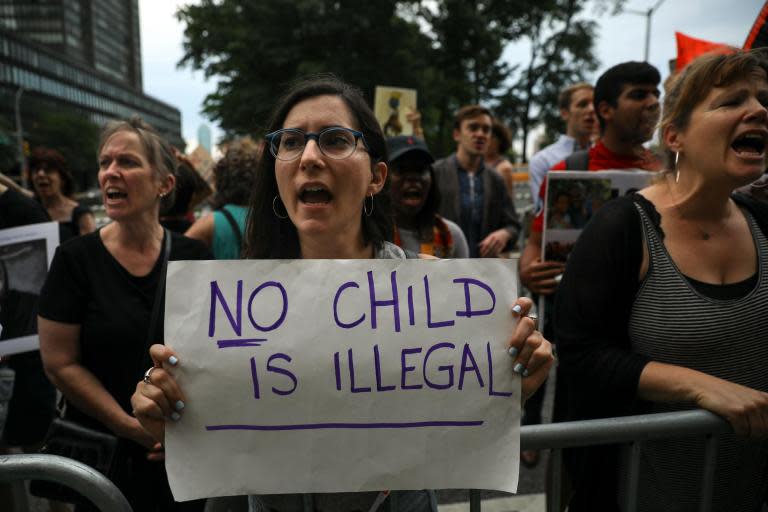Questions raised over Trump's quick-fix end to separating migrant families as republicans struggle to pass bill
Republicans are scrambling to round up sufficient votes to pass legislation intended to end the policy of separating migrant children from their families, a day after Donald Trump buckled to pressure and signed an executive order terminating the so-called “zero tolerance” approach.
On Capitol Hill, Republicans are trying to vote on two bills – one considered a hardline measure and another a “compromise”. Both would halt the practice of separating families entering the US illegally and address a range of other immigration issues.
But the party’s leadership has admitted that with the Democrats refusing to back either measure, they were struggling to find sufficient votes.
“Well, we’re working with our members. Obviously we have to get 218 votes and we’re working hard to get there,” congresswoman Cathy McMorris Rodgers, head of the House Republican Conference, told Fox News. “We’re not there yet but we’re working on it.”
Both House bills, backed by Mr Trump but opposed by Democrats and immigration advocacy groups, would fund the wall Mr Trump has proposed along the US border with Mexico and reduce legal migration, in part by denying visas for some relatives of US residents and citizens living abroad. Reuters said the conservative bill would deny the chance of future citizenship to so-called Dreamers – immigrants brought illegally into the United States years ago when they were children.
Even if a bill clears the House, it would face an uncertain future in the Senate, where legislators are considering different measures and where Republicans would need at least nine senators from the Democratic caucus to join them to ensure any bill could overcome procedural hurdles.
“What is the purpose of the House doing good immigration bills when you need nine votes by Democrats in the Senate, and the Dems are only looking to Obstruct,” Mr Trump tweeted on Thursday.
The manoeuvring on Capitol Hill came a day after Mr Trump signed an executive order that put an end to practice of separating families at the border – a move he felt obliged to take after taking measure of the outrage it had triggered across the US and internationally. Mr Trump’s wife, First Lady Melania Trump, was among those who spoke out against the policy that was introduced in May and which had separated more than 2,000 children from their parents.
Yet Mr Trump’s move caused as much confusion as it did bring clarity. While his action halted the policy of separating families, his move would seek to hold migrants charge with a crime indefinitely. It is unclear whether the courts would permit holding families in custody for more than 20 days, the current limit because of a 1997 court order.
“We’re going to have strong – very strong - borders, but we are going to keep the families together,” Mr. Trump said as he signed the order in the Oval Office. “I didn’t like the sight or the feeling of families being separated.”
Activists pointed out the order did nothing to address the plight of the more than 2,300 children who have already been separated from their parents under the president’s policy. Federal officials initially said those children would not be immediately reunited with their families while the adults remain in federal custody during their immigration proceedings.
Democrats want open Borders, where anyone can come into our Country, and stay. This is Nancy Pelosi’s dream. It won’t happen!
— Donald J. Trump (@realDonaldTrump) June 21, 2018
“Trump has shown he has zero tolerance for migrants, zero tolerance minors seeing to be reunited with their families,” Yanira Arias, national campaigns manager of the activist group Alianza Americas, told The Independent.
She said Mr Trump appeared to have no interest in the fact that children and their parents – many of them from Guatemala, El Salvador and Honduras, which are three of the deadliest nations in the world – were simply seeking a better life.
“These children are still being put on buses,” she said. “To me, this feels more like a big PR action.”
The Associated Press said while Mr Trump had acted unilaterally to stem the family separations, legislators would prefer a legislative solution to the problem. The administration is not ending its “zero tolerance” approach to border prosecutions. If the new policy is rejected by the courts, which the administration acknowledges is a possibility, the debate could move back to square one, the news agency said.

 Yahoo News
Yahoo News 

